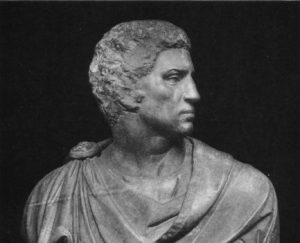Winner of the Spring 2017 StMU History Media Awards for
Best Article in the Category of “People”
On January 30, 1933, Adolf Hitler was appointed Chancellor of Germany. Hitler quickly turned Germany’s fragile Weimar democracy into a one-party dictatorship. During his rule, Hitler pursued a plan to harass one half-million German Jews to leave Germany. Hitler promoted a “master race” scheme that sought to keep the so-called Aryan race pure from racial contamination from all other races he deemed to be inferior. This Aryan race consisted of only Germanic peoples who had the characteristics of blond hair, blue eyes, and light colored skin. Three years after taking power, Hitler hosted the 1936 Olympics in the German capital of Berlin. This was his opportunity to put his “New Germany” on display for all the world to see.

As Hitler’s Nazi government prepared for these Olympics, athletes from the United States were also preparing themselves for the coming competition in Berlin. In the United States, African Americans were dealing with their own problems of racism. Not only was life hard as an African American in the 1930s, but life was even harder as an African American athlete. One African American, who would later become one of the most famous athletes in the history of Track and Field, was James Cleveland “Jesse” Owens. At the age of eight, he had moved to Cleveland, Ohio with his family, who had sought for better work and educational opportunities. “On his first day of school, he introduced himself as ‘J. C.,’ but his teacher misunderstood him to say “Jesse.” The young Owens bashfully accepted the mistake, thus taking on the name by which he would become famous.”1 Jesse Owens would grow up loving to run. He was the fastest runner in his school and loved competing against others. His dream was to attend the University of Michigan, but there were no scholarships offered in those days and his parents could not afford tuition. Instead, he attended Ohio State University, where he worked for the boosters to pay for his expenses.
In the Summer of 1936, at the Olympic trials, Jesse finished first in all three of the events that he competed in. He had trained hard in the preceding months, and the hard training paid off, allowing Owens to attend the Olympics of 1936, known as “The Nazi Games” or as “Hitler’s Games.” In actuality, these Olympic games were not originally intended to be games hosted by the Nazis: the “Nazis were never invited to host the Games—and probably never would have applied to do so. Instead, the International Olympic Committee (IOC) had awarded the Olympics to Germany’s Weimar Republic in 1931 before the Nazi takeover as a way of welcoming Germany back to sports respectability.”2

Ironically, Adolf Hitler knew nothing about sports and expressed little interest in hosting the Olympics; instead he wished to host an all-German athletic celebration. “But Dr. Josef Goebbels, the influential minister of propaganda, glimpsed how Germany might score a tremendous public-relations coup and convinced Hitler to support both the Winter and Summer Games.”3 Influenced by Dr. Josef Goebbels, Hitler used these Olympic games as a political relation with other countries.
Several weeks after the Olympic trials, Jesse Owens competed in the Berlin Olympics and made a name for himself. He won four gold medals, in the 100m, 200m, 4x100m relays, and in the long jump. Jesse Owens had set records and represented America in a humble and most respectable way, considering the circumstances. Even though many have claimed that Adolf Hitler refused to congratulate Jesse Owens, others go further by claiming that Hitler actually “snubbed” Owens:
By the end of that fabulous week in Berlin, an attractive yarn attached itself to the name of Jesse Owens. Supposedly, he was ‘snubbed’ by Adolf Hitler, who reportedly refused to congratulate him publicly after his victories. Actually, the story was concocted by American sportswriters, who were all too willing to read the worst of motives into Hitler’s behavior and to assume innocent excellence from America’s newest hero. Although it had no basis in fact, the story of ‘Hitler’s snub’ was repeated so often that people took it as truth. It remains one of the great anecdotes of American popular culture.4

Racism was as alive in the United States as it was overseas in Germany in the 1930s. German Jews were a persecuted minority in the 1930s, and African Americans were experiencing similar treatments of racism in 1930s America. “World reaction to Hitler’s program resulted in a movement to boycott Nazi goods and services, which included a movement to take away the 1936 Olympics from Berlin in an attempt to force the German government to cease its discriminatory practice against the Jews.”5 It was not until the United States entered World War II that sentiment against racism began to penetrate the American social consciousness. Even though Owens continued to face white racism in his own country subsequent to his Olympic victories, he later reflected on his experiences of racism: “What I’ve done is no more than countless other Negros (and Jews, Poles, Greeks and just Americans in general) have done…. I’ve been a Negro in America for fifty-seven years, and I want to tell you that [being black in America] can be pure hell at times and can shake anyone’s sureness. Often it’s worse if you were the world’s fastest human.”6 When Owens returned to the United States after the Olympics, President Franklin Delano Roosevelt refused to acknowledge his accomplishments or even invite him into the White House. It was not until 1979 that President Jimmy Carter presented Jesse Owens with the Living Legend Award. Forty-three years after his Olympic victories, Jesse Owens had finally been properly recognized for his great achievements.
Despite all the controversy that Jesse Owens encountered while doing what he loved, he is a true representation of perseverance and determination. Jesse Owens passed away in March of 1980 from lung cancer.
- Salem Press Biography Encyclopedia, January 2017, s.v. “Jesse Owens,” by William J. Baker. ↵
- John Rodden and John P. Rossi, “Berlin Stories,” Commonweal 143, no. 13 (August 12, 2016): 25. ↵
- John Rodden and John P. Rossi, “Berlin Stories,” Commonweal 143, no. 13 (August 12, 2016): 26. ↵
- Salem Press Biography Encyclopedia, January 2017, s.v. “Jesse Owens,” by William J. Baker. ↵
- D. A. Kass, “The Issue of Racism at the 1936 Olympics,” Journal of Sports History, no. 3 (1976): 223. ↵
- Joseph Boskin, “Jesse Owens: Running in the American Dilemma,” Review in American History, no. 3 (1987): 457. ↵



161 comments
Kailan Pena
I have heard of Jesse Owens’ story of triumph and success in the face of such adversity, but I never really knew about Jesse Owens. This article was very informative on Jesse’s struggles and it accurately described both sides of the scope, as in Jesse’s and Hitler’s respective sides, and it was also interesting to learn that Owens died of lung cancer, I would’ve never guessed that was how he passed.
Carlos Vazquez
The horrors of world war two haunts us to this day. Although in 1936 no one imagined the extent of the damage Hitler would cause, Jesse Owens’ victory sent a message to Nazi Germany that people of color and different religions could win just anyone else. I had heard Owens’ victory in the Olympics before but I never really knew what actually happened. This article is very well written and informative.
Carlos Sandoval
This was a great article. I knew right when I saw the title that this article would keep me hooked. I love sports and especially the Olympics, I knew a lot about his story and everything that he had to overcome. I did not know that the president and America refused to acknowledge him and his accomplishments. It is crazy that you could outshine the world and dominate them, but due to segregation no one showed their pride for him being an American athlete just like everyone else.
Alexander Cruz
It’s sad to hear how Jesse Owens died despite all he accomplished. He will always be a true inspiration of mine, not only for his incredible talents but for all his other feats as well. To win the Olympics, for your country, only to come back and not be recognized by the president of the united states really does suck. It is good however that he eventually did get that, as his speed and abilities rival even those today.
-AC
Elias Garza
I find it kind of funny how Jesse’s teacher got his name wrong as a kid and it carried on with him as he became famous. I also find how Jesse placed first in all his events when he competed at the Olympic trials in 1936 fascinating and he did not stop there. His success began to increase as his career moved on. I ran cross country for two years in high school and I know how much work it takes to be successful in that sport.
Hannah Wilson
Jesse Owens is one of the most well-known track athletes in Americas history. I thought it was interesting how he got his nickname and he stuck to it. One of the things I found disappointing was that even our own President would not congratulate him, and that he had to face so many obstacles throughout his life. I am glad that his accomplishments were finally recognized as they should have been 40 years before. Great article.
Iris Henderson
The story of Jesse Owens is one that reflects the time in which he accomplished his greatest fetes (1930’s). I knew almost nothing of this great American athlete and I am now interested to learn more. Reading that he wasn’t acknowledged by the evil dictator Adolf Hitler, comes to know surprise. However, discovering that our very own President Roosevelt refused to acknowledge Jesse is very disappointing, to say the least. This clearly shows the social/political climate of the times.
Julio Morales
This was a truly interesting article to read. I like to read anything sports related as well as bits and pieces of history, so when I saw the title of this article I was instantly hooked. To be honest I have never heard of Jesse Owens but I think he was tremendously brave for going over to a country like Nazi Germany and winning despite possible backlash from Adolf Hitler. It is true that in America during that era there was racism all over but I don’t think it could ever be compared to the level of racism that existed in Nazi Germany.
Cristina Cabello
While growing up I had heard of Jesse Owens but never really knew his story. As a former cross country and track athlete, this article caught my attention. Just by being an athlete is hard. But by living in a time period where almost the whole world discriminates you is even harder. I am amazed by Jesse Owens for putting up with all of the disapproval and made himself shine. I love hearing about all the humbling and historical leaders.
Luis Morales
This was a fantastic article. I had known very little about Jesse Owens and what he had accomplished in the 1936 Olympic games. I also like how you incorporated Jesse’s early life and how he got the name Jesse. It is not surprising but very sad that it took nearly 40 years for his accomplishments to be recognized by America.